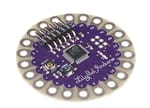The LilyPad Arduino is rather special and unique in the world of microcontroller boards, as the system was specifically designed for fabrics and wearables. Once you’ve got a LilyPad in your possession, the sky’s the limit when it comes to projects that fall into this category.
With conductive thread, sensors, lights, and minimal external components, you can put it to work to make everything from light-up clothing items to sensor-based household gadgets.
In this article, you’ll find some inspiration from LilyPad Arduino projects that run the gamut of possible uses. We’ve focused on projects that are easy to replicate and serve a wide variety of experiences, including some for beginners as well as ones for the more advanced LilyPad user.
The project tutorials feature helpful photos, videos, and instructions to guide you through your LilyPad adventure. The best part is that the ideas presented in this list can be customized to your own needs and likes.
Let’s get right to it!
Just For Fun
From Star Wars-themed sweaters to a bright purse, these fun LilyPad projects will give your wardrobe a glow up!
Death Star Christmas Sweater

This creative, eye-catching Death Star Christmas sweater is the perfect DIY gift for the Star Wars fan in your life. It’s all made possible with the help of your LilyPad Arduino and a few other materials, all of which are listed clearly in the YouTube tutorial description.
With some basic sewing skills and LED lights, creator Taylor Sparks walks users through this easy-to-follow tutorial from beginning to end. The LilyPad Arduino and battery hold up well, so the sweater should be able to glow for hours!
This project is best suited for those with some LilyPad prior experience, as it requires more complex programming, sewing, and assembly skills than other ideas on this list. But after completing a few other projects, you’ll be able to get to it in no time!
- Who designed it? Taylor Sparks
- Difficulty: Intermediate
- Where to find it? YouTube, GitHub
LED Unicorn Horn

Ever imagined yourself as a unicorn? You can make this a reality with your LilyPad Arduino, a basic baseball hat, and some NeoPixel sticks in this fun Instructables tutorial. Bonus: the unicorn horn is made via 3D printing, so it’s yet another fun, crafty element in the project that can let you bring more skills to the table. If your printer’s not willing to cooperate, you can always turn to Craftcloud.
All of the required materials are listed, and you’ll follow clear instructions that lay out the steps from start to finish. Another bonus: the creator has included a YouTube video, so not only do you have the written instructions and photos to utilize, you’ve got video instructions as well. Time for a glow up!
- Who designed it? hilalgungor
- Difficulty: All levels
- Where to find it? Instructables
Spider Costume
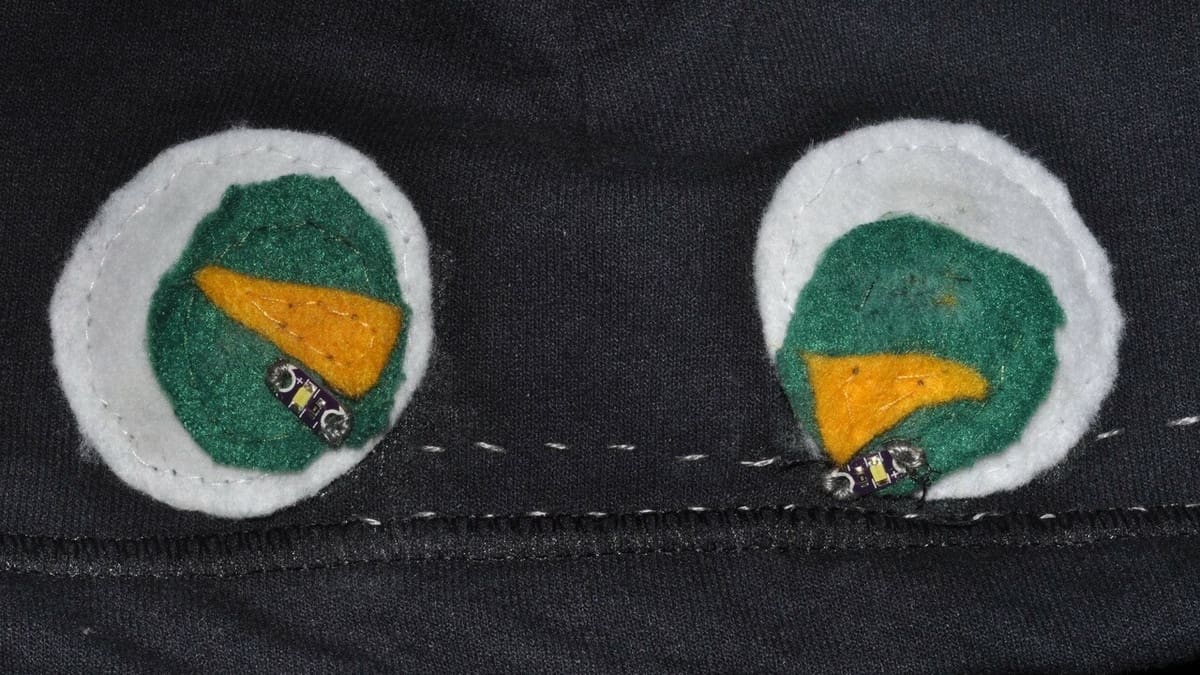
A little bit creepy but mostly cute, this spider costume comes to life with the help of your LilyPad Arduino and some sewing. Note that no sewing machine is needed, so this might be a perfect choice for those looking for a hand-sew-only project!
The LilyPad lights up the eyes on this spider costume with LED lights. The project requires a fair amount of materials ranging from fabric to electronics, but the vast majority should be inexpensive or common household items. It’s still a pretty budget-friendly project that will impress all of your kid’s friends for Halloween or a school project.
The creator includes sewing instructions for the entire costume, so you’ll get detailed information on how to piece it together, including the LilyPad eyes.
- Who designed it? sharonLKP
- Difficulty: Intermediate
- Where to find it? Instructables
Marquee Party Bag
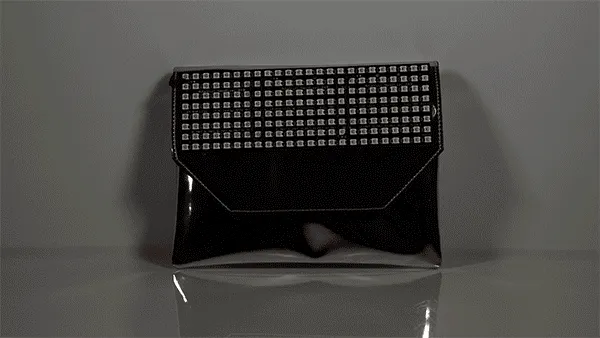
You’re sure to light up the party with this cool marquee light bag, put together with the LilyPad Arduino, LED matrices, and a bit of soldering and gluing magic.
Overall this project is appropriate for all levels of LilyPad users, but it will certainly help to have some experience with the software and crafting. You can make the marquee spell out letters, a message, or a colorful pattern, depending on what you’re in the mood for or the type of event.
In the tutorial, you’ll get comprehensive instructions that help you put this magical purse together, as well as two example codes that you can opt for, in terms of what the lights will do.
- Who designed it? Feldi
- Difficulty: All levels
- Where to find it? SparkFun
Night Sky Costume

This stunning costume made with the LilyPad Arduino is a fantastic project for advanced sewers with prior LilyPad experience. You’ll get to put your skills to the test by putting together a gorgeous cape that lights up in constellations like the night sky.
Keep in mind this project was completed over the span of several weeks, so don’t wait till the last minute before Halloween!
Helpful photos, well-written instructions, and links to additional tutorials (that can help clarify various steps of the project) make this luscious cape the best way to show off your technical talents.
The maker also recommends denim as a possible fabric for crafting if you don’t have access to the material used in the tutorial, as it’s robust and would still look eye-catching.
- Who designed it? Feldi
- Difficulty: Advanced
- Where to find it? SparkFun
Glowing Pin

Let your creativity shine with this LilyPad pin craft!
This project is a solid choice for those starting out with the LilyPad Arduino without years of extensive sewing experience. You’ll end up with a wearable pin that lights up that you can put on clothing or bags. A nice aspect is you can use your own design for this project or a premade template. The tutorial offers a few templates to get you started, like the smiley face above, a shooting star, and a rocket ship, just to name a few.
Creator Gella walks users through the procedure of this pin craft with helpful graphics, photos, and creative suggestions. If you enjoy this pin project, you might want to check out the creator’s mask costume. Note that this project requires the LilyPad Sewable Electronics Kit, which means that you’ll find most (or all, depending on what you’re going for) components included.
- Who designed it? Gella
- Difficulty: All levels
- Where to find it? SparkFun
Health & Home
LilyPad Arduino projects aren’t just for show. They also offer great functionality, whether you’re using them to add light to your bike or staying in shape.
Arduino Sensor Demo Mat
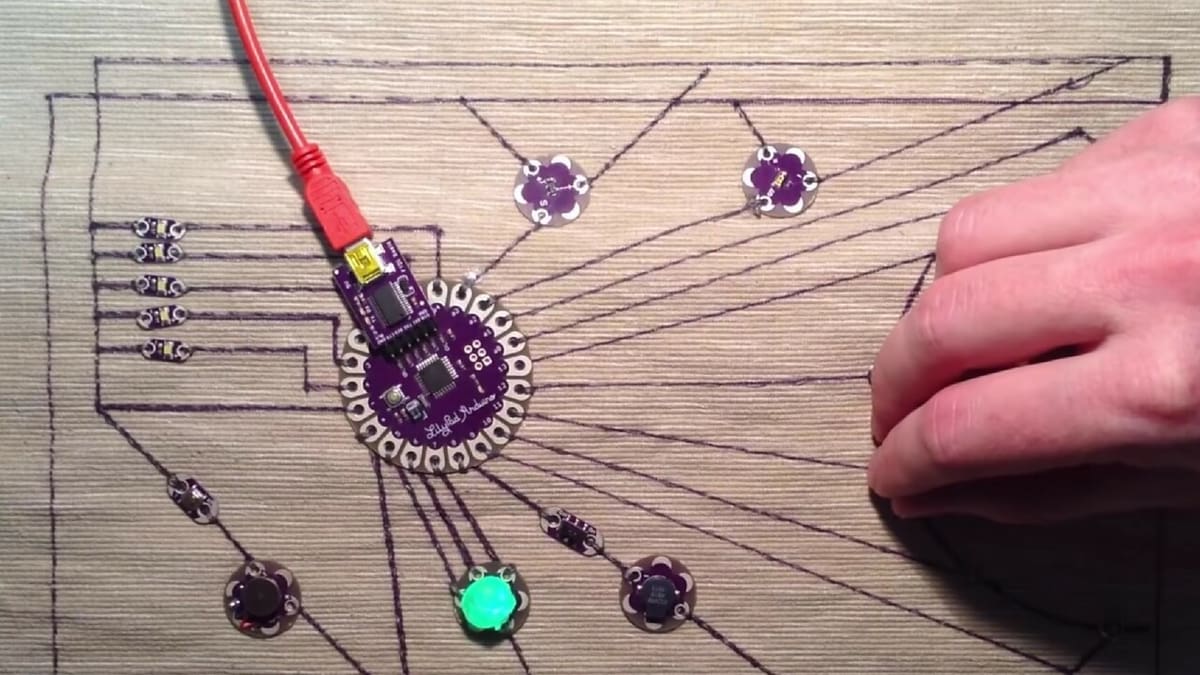
This is as good a project to get started with as it gets.
With it, you’ll get to create a mat that allows you to experiment and show off different functions of sensors using the LilyPad, so it may be a great starting point if you want to learn what you can do before committing to another project.
The sewing requirement, while relatively intense (using conductive thread), isn’t especially complicated, so it might be an ideal choice for those with less experience in sewing, too.
In addition to the instructions, you can watch the mat in action. Fun fact: the project came in second place in the Sensors Contest on Instructables and considering there were 190 entries, it’s nothing to scoff at! We’d say it was well deserved.
- Who designed it? duniken
- Difficulty: Beginners
- Where to find it? Instructables, YouTube
Blinking Bike Safety Patch
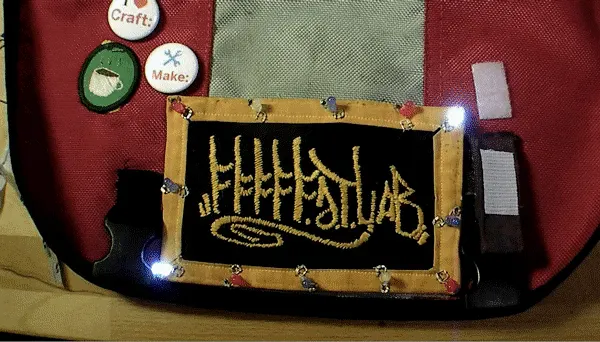
Bike riders know all too well that safety on the road is paramount. Being visible at night, on foggy days, and really at all times while riding around becomes fun and easy with this awesome blinking safety patch project.
With the assistance of your LilyPad Arduino, flashing LEDs, and a sewn patch with conductive thread, you’ll be seen with ease by other bikes and cars. While this specific project is for adding the lights, the creator also has a dedicated tutorial for the embroidery itself.
This is a fairly sophisticated and challenging project, and not recommended for beginners.
Important note: this project does not replace an actual helmet or bike lights. It’s meant to enhance bike safety rather than replace anything. Additionally, the creator suggests removing the patch in rainy weather or just the battery so the circuit remains intact.
- Who designed it? bekathwia
- Difficulty: Intermediate/advanced
- Where to find it? Instructables
Automatic Foot Massager
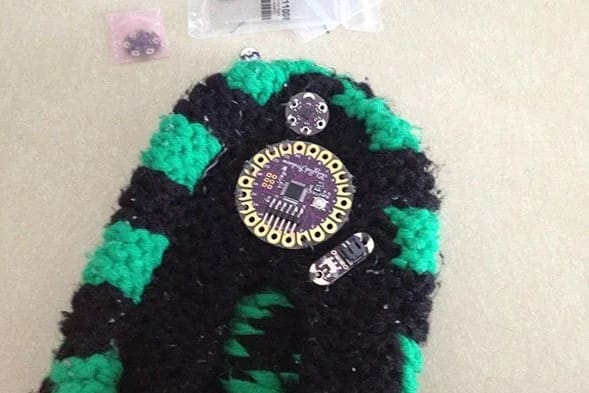
Through the magic of the LilyPad Arduino and an accelerometer, your feet will get quite the treat with this clever slipper foot massager. The sensor detects a vertical position – for instance, if you put your feet up when you sit on an armchair – and gets to work. A finalist in the Instructables Sensors Contest, we’d say this project is a winner!
Though you will need a bit of LilyPad and sewing knowledge, the project steps and crafting element are quite straightforward, so no advanced skills are necessary. All materials and steps are carefully listed, with videos and links to materials for purchase.
- Who designed it? melarky
- Difficulty: Advanced/beginner Intermediate
- Where to find it? Instructables
Sitting Sensor

Trying to up your fitness level? This LilyPad Arduino sitting sensor project is here to help. It handily alerts the user if they haven’t gotten up from a seated position within a certain time frame so that they remember to stand or stretch.
The code starts at 10 seconds but can be adjusted according to the user’s wants or needs. Overall it’s a fairly budget-friendly project too.
With the help of video demos, written instructions, and helpful photos and schematics, this is a great project for LilyPad users of all levels, as the coding and construction aspects aren’t terribly complex. It’s also such a creative concept for staying in shape. Less sit, more fit!
License: The text of "The 10 Best Projects for the LilyPad Arduino" by All3DP is licensed under a Creative Commons Attribution 4.0 International License.
CERTAIN CONTENT THAT APPEARS ON THIS SITE COMES FROM AMAZON. THIS CONTENT IS PROVIDED ‘AS IS’ AND IS SUBJECT TO CHANGE OR REMOVAL AT ANY TIME.
